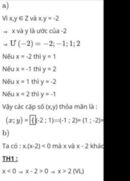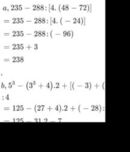\(2^{x-3}+2^x-288=0\)

Những câu hỏi liên quan
[288:(x-3)2-2] . (x2-169)=0
\(...\Rightarrow\left[{}\begin{matrix}288:\left(x-3\right)^2-2=0\\x^2-169=0\end{matrix}\right.\) \(\Rightarrow\left[{}\begin{matrix}288:\left(x-3\right)^2=2\\x^2=169\end{matrix}\right.\)
\(\Rightarrow\left[{}\begin{matrix}\left(x-3\right)^2=288:2\\x^2=13^2\end{matrix}\right.\) \(\Rightarrow\left[{}\begin{matrix}\left(x-3\right)^2=144=12^2\\x^2=13^2\end{matrix}\right.\)
\(\Rightarrow\left[{}\begin{matrix}x-3=12\\x-3=-12\\x=13\\x=-13\end{matrix}\right.\) \(\Rightarrow\left[{}\begin{matrix}x=15\\x=-9\\x=13\\x=-13\end{matrix}\right.\) \(\Rightarrow x\in\left\{-9;15;\pm13\right\}\)
Đúng 2
Bình luận (0)
Bài 1:a)Tìm số nguyên x,y sao cho :x.y=-2
b)Tìm x thuộc Z sao cho x.(x-2)<0
Bài 2:a)235-288:[4.(48-72)]
b)5^(3)-(3^3 + 4).2+[(-3)+(-25)]:4
4.32x-2.9x-54=0
\(\dfrac{1}{2}\).2x+4,2x-288=0
a, \(4.3^{2x}-2.9^x-54=0\)
\(\Rightarrow3^{2x}\left(4-2\right)=54\)
\(\Rightarrow3^{2x}=27=3^3\)
Vì \(3\ne\pm1;3\ne0\) nên \(2x=3\Rightarrow x=\dfrac{3}{2}\)
b, \(\dfrac{1}{2}.2^x+4.2^x-288=0\)
\(\Rightarrow2^x\left(\dfrac{1}{2}+4\right)=288\)
\(\Rightarrow2^x=64=2^6\)
Vì \(2\ne\pm1;2\ne0\) nên \(x=6\)
Đúng 0
Bình luận (0)
3 . 2 mũ x + 2 mũ x +1 + 2 mũ x+2 = 288
\(3.2^x+2^{x+1}+2^{x+2}=288\\ \Leftrightarrow2^x\left(3+2+2^2\right)=288\\ \Leftrightarrow2^x=32=2^5\\ \Leftrightarrow x=5\)
tik mik nha
Đúng 2
Bình luận (0)
Ta có: \(3\cdot2^x+2^{x+1}+2^{x+2}=288\)
\(\Leftrightarrow2^x\cdot\left(3+2+4\right)=288\)
\(\Leftrightarrow2^x=32\)
hay x=5
Đúng 0
Bình luận (0)
26-3.(x+3)^2 =-7^2
8,6+288:(x-3)^2=50
a: =>3(x+3)2=26+49=75
=>(x+3)2=25
=>x+3=5 hoặc x+3=-5
=>x=2 hoặc x=-8
b: =>288:(x-3)2=50-8x6=2
=>(x-3)2=144
=>x-3=12 hoặc x-3=-12
=>x=15 hoặc x=-9
Đúng 1
Bình luận (0)
tìm x, biết
2^x+ 2^x+3=288
2x+2x+3=288
=>2(2x)=288-3=285
2x=142,5(vô lí)
=>ko có x thỏa mãn
Đúng 0
Bình luận (0)
\(2^x+2^{x+3}=288\)
\(\Leftrightarrow2^x+2^x.2^3=288\)
\(\Leftrightarrow2^x\left(1+2^3\right)=288\)
\(\Leftrightarrow2^x=32=2^5\)
\(\Leftrightarrow x=5\)
2x+2x+3=288. tìm x
=>2x.(1+23)=288
=>2x.9=288
=>2x=288:9
=>2x=32
=>x=5
Đúng 0
Bình luận (0)
2x+2x+3=288
2x.1+2x.23=288
2x(1+23)=288
2x.9=288
2x=288:9
2x=32
2x=25
=> x=5
Vậy x=5
Đúng 0
Bình luận (0)
Tìm x, biết: \(\frac{1}{2}\cdot2^x+4\cdot2^x-288=0\)
\(\Rightarrow2^x\left(\frac{1}{2}+4\right)=288\Rightarrow2^x.\frac{9}{2}=288\Rightarrow2^x=64=2^6\Rightarrow x=6\)
Đúng 0
Bình luận (0)
\(\)\(\left(\frac{1}{2}+4\right).2^x=288\)
\(\frac{9}{2}.2^x=288\)
\(2^x=64\)
\(2^x=2^6\)
=> x=6
Đúng 0
Bình luận (0)
\(\dfrac{x}{2}\)=\(\dfrac{y}{3}\)=\(\dfrac{z}{6}\)và\(x^2\).\(y^2\).\(z^2\)=\(288^2\)
Đặt \(\dfrac{x}{2}=\dfrac{y}{3}=\dfrac{z}{6}=k\)
\(\Leftrightarrow\left\{{}\begin{matrix}x=2k\\y=3k\\z=6k\end{matrix}\right.\)
Ta có: \(x^2y^2z^2=288^2\)
\(\Leftrightarrow36k^2=288^2\)
\(\Leftrightarrow k^2=2304\)
Trường hợp 1: k=48
\(\Leftrightarrow\left\{{}\begin{matrix}x=2k=96\\y=3k=144\\z=6k=288\end{matrix}\right.\)
Trường hợp 2: k=-48
\(\Leftrightarrow\left\{{}\begin{matrix}x=2k=-96\\y=3k=-144\\z=6k=-288\end{matrix}\right.\)
Đúng 1
Bình luận (1)
Đặt \(\dfrac{x}{2}=\dfrac{y}{3}=\dfrac{z}{6}=k\)
\(\Rightarrow\left\{{}\begin{matrix}x=2k\\y=3k\\z=6k\end{matrix}\right.\)
\(\Rightarrow4k^29k^236k^2=288^2\)
\(\Rightarrow k^6=64\)
\(\Leftrightarrow\left[{}\begin{matrix}k=2\\k=-2\end{matrix}\right.\)
\(\Rightarrow\left[{}\begin{matrix}x=4,y=6,z=12\\x=-4,y=-6,z=-12\end{matrix}\right.\)
Đúng 1
Bình luận (0)






























